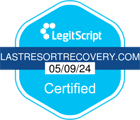We work with insurances. Verify yours now
Austin’s Premiere Military & Veterans Addiction Treatment


Discover new hope at The Last Resort, Austin’s premier men’s addiction treatment facility. Our substance abuse treatment programs are specially designed for veterans struggling with addiction and co-occurring disorders. We understand the unique challenges military veterans face when battling substance use disorders and provide a supportive environment where healing and recovery thrive.
Our veteran-focused approach combines compassionate support with evidence-based therapies to help veterans reclaim their lives from substance abuse issues. Join us at The Last Resort, where effective addiction treatment meets unwavering commitment to our heroes’ well-being.
Veterans face unique challenges when dealing with addiction, often stemming from their
military service experiences and the transition back to civilian life:[1, 2]
Many veterans have experienced traumatic events during their service, leading to post-traumatic stress disorder (PTSD). Substance use can become a coping mechanism for these unresolved traumas, creating a cycle of dependency that requires specialized substance abuse treatment.
Veterans often suffer from chronic pain due to injuries sustained in service. This can lead to the overuse or misuse of prescription pain medications, which may escalate into substance abuse requiring professional intervention.
Beyond PTSD, veterans may also struggle with depression, anxiety, or other co-occurring disorders. Substance use frequently becomes a way to self-medicate these symptoms, highlighting the need for integrated treatment approaches.
Returning to civilian life can be isolating for veterans, especially if they feel disconnected from family, friends, or community. Substance use may offer a temporary escape from feelings of loneliness or alienation, but ultimately worsens these conditions.
Veterans may face challenges in accessing timely and appropriate healthcare, including substance abuse treatment services. Issues such as stigma or bureaucratic hurdles can hinder their ability to seek the help they need.
The military culture often emphasizes strength, self-reliance, and camaraderie. Admitting to or seeking help for substance abuse can be perceived as a sign of weakness or failure, making veterans reluctant to pursue treatment options.
Addressing these challenges requires a holistic approach that considers the unique needs of veterans. From specialized programs that integrate mental health care to trauma-informed therapy and peer support, comprehensive treatment plays a vital role in recovery from substance abuse.
Identifying signs of addiction in veterans can be vital for accessing the appropriate care:[3]
Veterans may start using alcohol or drugs more frequently or in larger quantities than before, often to manage symptoms related to service experiences.
Exhibiting physical or psychological withdrawal symptoms when not using the substance, such as irritability, anxiety, or tremors, indicating physical dependency.
Sudden mood swings, agitation, or hostility can indicate underlying issues related to substance use and require professional assessment.
Strained relationships with family members, friends, or colleagues, often due to changes in behavior or priorities influenced by substance abuse.
Difficulty managing finances or borrowing money to support substance use habits, which can create additional stress in the recovery process.
Decline in physical health, such as unexplained weight loss, frequent illnesses, or neglecting personal hygiene, often accompanying chronic substance abuse.
Involvement in legal issues related to substance use, such as DUI arrests or other legal consequences, which may complicate the treatment process.
Veterans may deny or minimize their substance use when confronted, or they may try to hide their behaviors, making early intervention challenging.
It’s important to approach these signs with sensitivity and empathy, understanding the complex factors that contribute to substance abuse in veterans. Encouraging veterans to seek professional help and support from specialized substance abuse treatment programs tailored to their unique needs can make a significant difference in their recovery journey.
Encouraging veterans to seek professional help and support from specialized addiction treatment programs tailored to their needs can make a significant difference in their recovery journey.

More than one in ten veterans have received a diagnosis of a substance use disorder, a rate slightly higher than that observed in the general population.[4] Veterans also face several challenges that come along with substance use as well, including pain management, heightened suicide risk, trauma from military service, and the risk of homelessness.
Furthermore, more than two out of every ten veterans diagnosed with PTSD also struggle with a substance use disorder, with one in three who seek addiction treatment also suffering from PTSD.[5] These dual diagnosis challenges highlight the critical need for integrated and comprehensive approaches to address both conditions effectively among veteran populations.

At The Last Resort, we pride ourselves on creating an environment that resonates with veterans, built on shared values and structured support systems. Our approach provides veterans with a sense of security and predictability, helping veterans feel safer and more comfortable.
We offer specialized programs tailored for veterans battling substance abuse, including:
Trauma-informed substance abuse treatment addressing military service experiences
Equine therapy programs that build trust and emotional regulation
Structured 12-step programs that provide a familiar framework for the recovery process
The Healing Heart program specifically addressing the unique challenges faced by veterans with substance use disorders
The Last Resort is a place where veterans find understanding, structured support, and innovative treatment for substance abuse. By respecting veterans’ values, providing specialized programs, and offering targeted support, we ensure that you can begin your recovery journey in a safe and supportive environment.
Healing from addiction and dual diagnosis challenges requires comprehensive care and a holistic approach to substance use treatment and addiction recovery. Thankfully, The Last Resort specializes in providing men with evidence-based therapies and a supportive community for our military veterans.
Come experience a healing adventure like none other. Our expansive and secluded men’s-only ranch sits on 55 acres of central Texas beauty and is a tranquil sanctuary designed to promote rest, reflection, and recovery.
From rolling hills and ancient tree groves to warm ranch-style accommodations, you’ll feel right at home. You’ll enjoy a full range of amenities and experiences, including an outdoor pool oasis, a fitness studio, and a fully-stocked horse barn.
Our secondary location is a comfortable, modern facility with shared and private spaces that is home to all of our outpatient services. This center is conveniently located in south Austin off Menchaca Rd.
The Department of Veterans Affairs offers comprehensive benefits that may cover substance abuse treatment services for eligible veterans. These benefits typically include assessment and evaluation for substance use disorders, medically supervised detoxification, residential rehabilitation programs, outpatient counseling and therapy, medication-assisted treatment, and continuing care and relapse prevention services.
The VA has made significant improvements in recent years to expand access to substance abuse treatment for veterans, recognizing the link between service experiences and substance use disorders.
In addition to VA benefits, many veterans have access to private insurance or TRICARE, which may provide coverage for substance abuse treatment services.
TRICARE offers coverage for various levels of substance abuse treatment, including detoxification, residential treatment, and outpatient services. Private insurance plans typically include some level of coverage for addiction treatment, especially following the implementation of the Affordable Care Act. Many plans now recognize substance abuse treatment as an essential health benefit.
Understanding your benefits for substance abuse treatment can be challenging. At The Last Resort, we’re here to help.
Our admissions team can help verify your insurance benefits and help you understand your coverage options and any potential out-of-pocket expenses. We offer guidance on accessing treatment with your available insurance coverage.
Paying for treatment should never be a barrier to recovery and healing. There are several options available that do not put your family in financial jeopardy. The Last Resort is an in-network provider that works with most insurance companies.








It takes courage to ask for help, and reaching out is the first step toward a brighter future. At The Last Resort, we have specialized substance abuse treatment programs designed for veterans, with resources standing by to assist you and your family with addiction and co-occurring mental health challenges.
Our veteran-focused approach to substance abuse treatment provides the structure, support, and specialized care you deserve. Contact our admissions team today to learn more about our substance abuse treatment programs for veterans in Austin, TX.
After completing a drug rehab program, you will typically transition to aftercare or ongoing support services. These may include outpatient therapy, support groups, and relapse prevention programs. The goal is to help you maintain sobriety and continue your recovery journey in a supportive environment.
To prepare for entering drug rehab as a veteran, consider gathering important documents such as your military discharge papers, health insurance information, and any medical records related to substance use or mental health issues.
It’s also helpful to communicate openly with loved ones about your decision and arrange any necessary logistics for your time at a recovery center, along with thinking about your specific needs for treatment.
If you know a fellow veteran who is considering treatment, offer non-judgmental support and encouragement. Listen actively to their concerns and provide information about available resources and treatment options.
Help them navigate the process by assisting with research, making phone calls, or accompanying them to appointments if they wish. Let them know they’re not alone and that seeking help is a courageous step towards healing.
The length of treatment varies based on individual needs. At The Last Resort, we develop personalized treatment plans based on your specific circumstances, substance use history, and the presence of any co-occurring disorders. There is no one-size-fits-all approach to recovery, and your progress and individual needs will determine your treatment duration. Our team works with each veteran to ensure they receive the appropriate level of care for the time needed to build a strong foundation for lasting recovery.
Help them navigate the process by assisting with research, making phone calls, or accompanying them to appointments if they wish. Let them know they’re not alone and that seeking help is a courageous step towards healing.
Absolutely. The Last Resort specializes in dual diagnosis treatment, addressing both substance abuse and co-occurring disorders like PTSD, depression, and anxiety. Our integrated approach ensures that both conditions are treated concurrently, which is essential for effective recovery and long-term sobriety.
Many veterans worry about confidentiality and career implications. Treatment at The Last Resort is confidential and protected by HIPAA regulations. While we encourage open communication with support systems when appropriate, your privacy is respected throughout the treatment process.
Our program addresses the unique challenges military personnel face, including combat trauma, military culture adjustment, and service-related stressors. We incorporate trauma-informed care and specific therapeutic approaches that resonate with veterans’ experiences, including our Healing Heart Experience program which is particularly beneficial for veterans working through service-related trauma.
Yes, family support is crucial for recovery. The Last Resort offers a comprehensive Family Program designed to educate family members about addiction, improve communication, and heal relationships affected by substance use. Family participation can significantly enhance treatment outcomes for veterans in recovery.
[1] Teeters, J., Lancaster, C., Brown, D., & Back, S. (2017). Substance Use Disorders in Military veterans: Prevalence and Treatment Challenges. Substance Abuse and Rehabilitation, Volume 8(1), 69–77. https://www.ncbi.nlm.nih.gov/pmc/articles/PMC5587184/ on July 2, 2024
[2] Abuse, N. I. on D. (2019, October 11). Military Life and Substance Use. National Institute on Drug Abuse. https://nida.nih.gov/research-topics/military-life-substance-use on July 2, 2024
[3] rfletcher. (2017, May 25). Recognizing Substance Use Disorders. Military OneSource. https://www.militaryonesource.mil/health-wellness/substance-abuse-addiction/understanding-and-identifying-substance-use-disorders/ on July 2, 2024
[4] National Institute on Drug Abuse. (2019). Substance use and military life drugfacts. National Institute on Drug Abuse. https://nida.nih.gov/publications/drugfacts/substance-use-military-life on July 2, 2024
[5] Acierno, R. (2023). Substance Abuse in Veterans – PTSD: National Center for PTSD. Va.gov. https://www.ptsd.va.gov/understand/related/substance_abuse_vet.asp on July 2, 2024
When drug or alcohol addiction takes root in your life, it colors everything you do, how you show up at work, at home, and for yourself. Your family often feels the worst of it. You know this is not what you had in mind for your life. There has to be a healthier way to manage your emotional distress and overcome the challenges you face.
As the opioid epidemic has continued to explode, so has the treatment industry. Unfortunately, not all are of the same quality or the same caliber.
Accredited status for our addiction treatment center confirms that the services we offer meet or exceed the official standards of practice established by the state and other governing organizations by passing a series of detailed assessments.
Understanding accreditation affords you and your loved ones the confidence to pursue long-term recovery with renewed peace of mind.




If you or a loved one is battling alcohol or drug addiction, you’re in the right place. Even if you’ve tried other treatment programs or think you’re at the end of the line, this is the community you need to thrive. We can’t wait to facilitate your recovery and be part of your success story.